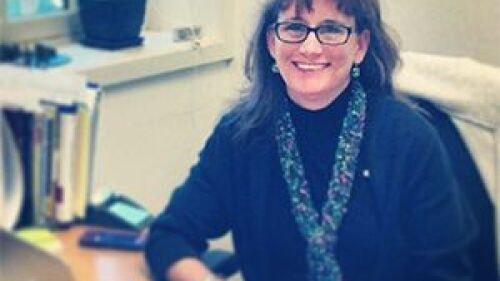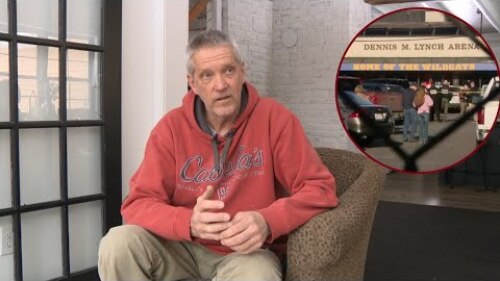By Jocelyn Rowley
Loveland Reporter-Herald
A couple of years ago, Thompson Valley Emergency Services Battalion Chief Dave Edwards was at Ball Arena in Denver for a Cirque du Soleil performance with his family when he noticed his oldest daughter, who is on the autism spectrum, didn’t seem to be enjoying the show as much as everyone else.
“I’m engaged, my wife is engaged, my youngest daughter is engaged, but our oldest daughter was rigid in her seat, and you could just tell from her face that she was not into it,” he recalled. “Stuff was moving fast and there were flashing lights and loud noises.”
At intermission, Edwards’ wife suggested that they try to find a set of headphones to ease their daughter’s discomfort, an idea he initially scoffed at.
“I thought ‘that’s the dumbest idea I’ve ever heard,’” he said. “I saw Cirque du Soleil t-shirt booths and food vendors, but there didn’t seem to be anything else. So I thought it was silly, but agreed to go look.”
A quick escalator ride to the main concourse was all it took to prove the idea wasn’t so silly after all. Almost immediately, Edwards and his wife found a guest services booth with a sign reading “Ask us about our sensory bags”.
After borrowing one, they returned to their seats with items meant to help those with sensory sensitivities.
“My daughter throws on headphones and has a weighted blanket on her lap. She was playing with a fidget toy,” he said. “And for the second half of the show, she’s not rigid — she’s relaxed, watching, engaged.”
That was Edwards’ introduction to KultureCity, a nonprofit that is now helping Thompson Valley Emergency Medical Services’ neurodivergent patients.
His experiences with his daughter made him realize that ambulances — with their flashing lights, loud sirens and unfamiliar people — can be especially overwhelming environments. To help people with sensitivities, he introduced his bosses to the organization and their kits. Now TVEMS is the first emergency medical service in Colorado to earn KultureCity’s “Sensory Inclusive” First Responder certification and carry the organization’s sensory kits in all of its ambulances.
“I brought the idea here and everybody said, ‘this is the best idea I’ve ever heard, let’s move forward,’” Edwards said. “So we reached out, we signed up. We got more than 90% of our team through the training. And now every day, when I go home, I get to tell my daughter we’re helping people like her, and she’s ecstatic.”
Headquartered in Alabama, KultureCity’s mission is to promote accessibility and inclusion for individuals with “invisible” disabilities, such as autism, PTSD, dementia and other sensory processing challenges, said Chief Operations Officer Joy Palmer. With more than 3,000 partners worldwide, including schools, sports arenas and first responders, the organization provides training and tools to ensure that individuals with sensory needs can participate fully in public life.
In its home state of Alabama, KultureCity helped advocate for the Cade Noah Act, which now requires state-certified officers to complete sensory training every two years, a move prompted by a tragic incident involving a person in crisis, Palmer said.
“As you can imagine, interacting in a first responder situation is already very, very overwhelming, and those with sensory needs can feel more overwhelmed, much more easily than those who are neurotypical,” she said. “So our first responder training is extremely important to make sure that they have the tools to help someone decompress and feel at ease.”
Palmer noted that first responders aren’t just critical during emergencies, they also serve as key touchpoints at community events and public functions. “Having those tools on hand, even outside of emergencies, really matters,” she said.
The sensory kits include the headphones, glasses, three fidget items and cards printed with pictures and symbols to help nonverbal patients communicate their needs. Patients can keep the items if they need support at the hospital or return them to be cleaned and restocked.
Thompson Valley EMS crew member Brenda Vasquez holds a visual cue card from a KultureCity sensory kit. The card helps nonverbal or overwhelmed patients communicate how they’re feeling during emergency situations. ( Jocelyn Rowley/Loveland Reporter-Herald )
As of late May, there is a sensory kit in every TVEMS-marked vehicle, though, as of last week, none had been deployed so far. The agency also has sensory kits available at two of its stations, including its headquarters on Clydesdale Parkway.
For Edwards, the training and kits are tools he wishes he had earlier in his career.
“I know that I was ineffective in my attempts to deescalate in the past, and now, in retrospect, I strongly suspect many of those involved these issues,” he said. “Our training in the past had been to talk calm, encourage them to relax — and if that were the only problem, then that would work great. It wouldn’t work for people who are suffering a sensory crisis.”
© 2025 Loveland Reporter-Herald, Colo.
Visit www.reporterherald.com.
Distributed by Tribune Content Agency, LLC.







